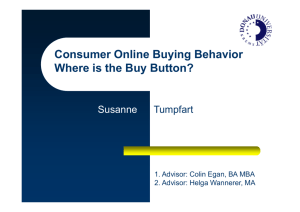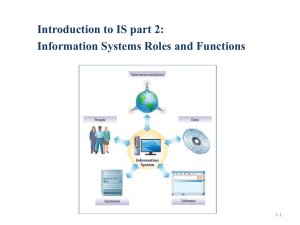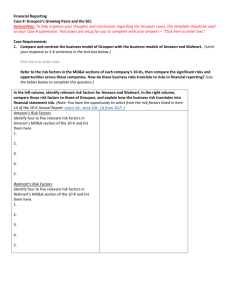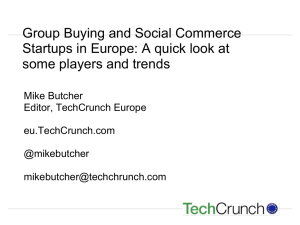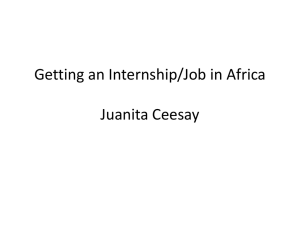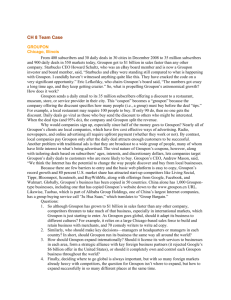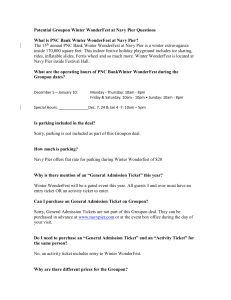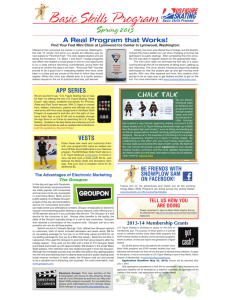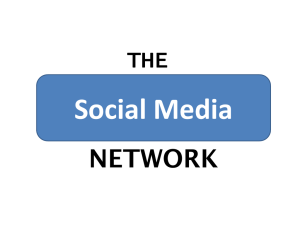Group + Coupon = Groupon Groupon.com: The Power of Collective
advertisement
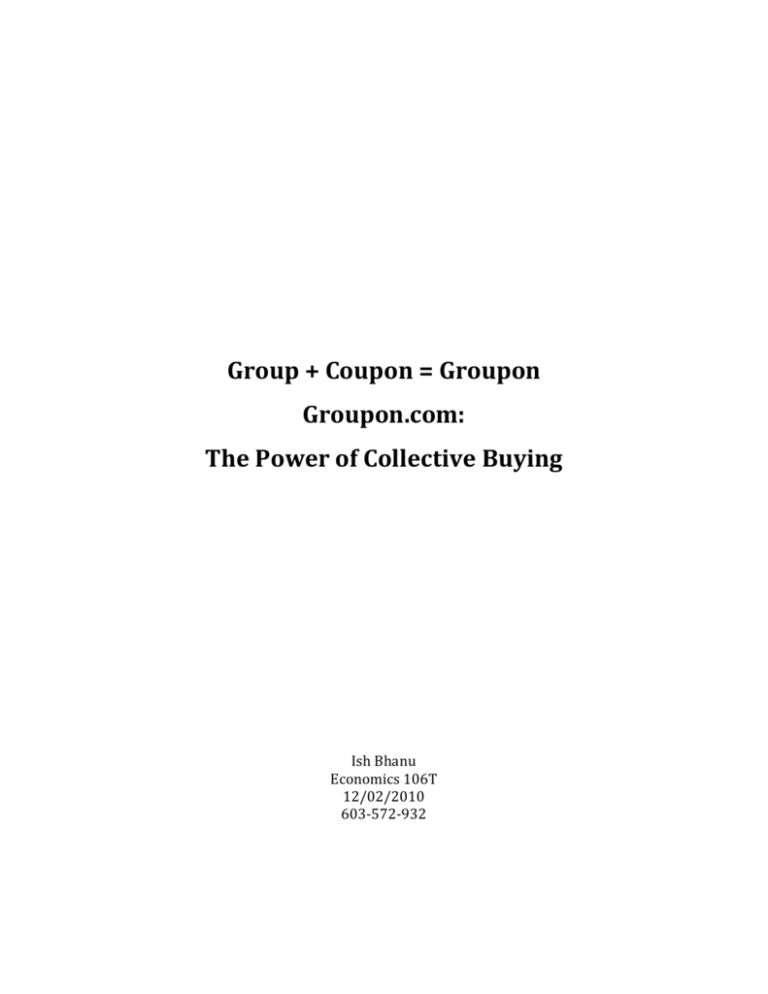
Group + Coupon = Groupon Groupon.com: The Power of Collective Buying Ish Bhanu Economics 106T 12/02/2010 603-572-932 Bhanu 2 Introduction Groupon is a one-deal-a-day website that brings an individualized deal to over 300 distinct geographic locations across North America, South America, and Europe. Because of a business plan dependent on the power of collective buying, Groupon is able to negotiate significant beneficial deals for consumers while businesses enjoy great exposure and if the Groupon is “tipped”, then the benefit of a massive influx of new clients. Groupon was not able to have such success without problems arising. Several Groupon clones have quickly sprouted up in markets around the globe and are creating a host of problems that Groupon must deal with. Groupon’s CEO Andrew Mason and his team of innovators now must constantly think about staying on top and competing in an industry with very minimal switching costs while also maximizing profits to please investors. A Historical Look Back CEO and founder Andrew Mason launched Chicago-based Groupon in November 20081. He modeled the website around a concept developed from another website, The Point. The Point was a nonprofit company whose website relied on the idea of collective buying power. Once enough people committed to donating money, they would be charged for their donation. If the site failed to attract enough donations, the deal fell through and no one was charged. This idea helped The Point community come together to solve problems that were too difficult to solve alone. Mercata was the first company to seriously apply the idea of collective buying power to consumer products in 20012. Though not destined to survive for Keane, Meghan. "Q&A: Groupon's Andrew Mason | Econsultancy." Econsultancy | Community of Digital Marketing and Ecommerce Professionals. 2 Dec. 2009. Web. 01 Dec. 2010. <http://econsultancy.com/us/blog/5017-q-a-groupon-s-andrew-mason>. 2 Coburn, Lawrence. "Groupon CEO Andrew Mason Talks Growth, Clones, and Why Groupon Isn’t a Coupon Site." The Next Web | TNW Is the International Source for Internet News, Business and Culture. 24 Mar. 2010. Web. 01 Dec. 2010. <http://thenextweb.com/location/2010/03/24/grouponceo-andrew-mason-talks-growth-clones-groupon-coupon-site/>. 1 Bhanu 3 long, their demise was not due to their business plan, but with whom they were competing against. Groupon CEO Andrew Mason said it best when he attributed this failure to their lack of diversity in their product set and competing against big warehouse stores, whom they did not have the financial backing to adequately compete with3. Mercata also had a problem with delivering their discounts, most consumers seeing them only a week later. Mason asserted that Groupon had the resources and the finely tuned business model to avoid these pitfalls that had plagued Mercata from the start4. Groupon Business Model In a strong effort to succeed where Mercata had failed and to leverage the concept gained from The Point, Groupon carefully crafted their business model. It was simple, clean, and easy to use. There was to be one deal each day in each participating city. This would allow the company to minimize distractions associated with other large diverse ventures. The products and services offered were also to vary greatly so as to minimize the accumulation of thrift shoppers who would simply live from Groupon to Groupon5. The idea was to help people experience something they never though that they would do or maybe were on the fence about and needed a little incentive to try it. The way Groupon functioned was modeled on the idea that The Point pioneered. In order for a deal to have become active a certain number of consumers had to commit to the deal6. Once that number had been reached and had passed “the tipping point” the deal became active and those who had committed earlier were Coburn, Lawrence. "Groupon CEO Andrew Mason Talks Growth, Clones, and Why Groupon Isn’t a Coupon Site." The Next Web | TNW Is the International Source for Internet News, Business and Culture. 24 Mar. 2010. Web. 01 Dec. 2010. <http://thenextweb.com/location/2010/03/24/grouponceo-andrew-mason-talks-growth-clones-groupon-coupon-site/>. 4 Ibid. 5 "About Us." The Daily Groupon | Coupons, Discounts, and Deals on the Best in Seattle. Web. 01 Dec. 2010. <http://www.groupon.com/about>. 6 Carpenter, Steve. "A TC Teardown: What Makes Groupon Tick." TechCrunch. 02 May 2010. Web. 01 Dec. 2010. <http://techcrunch.com/2010/05/02/teardown-groupon/>. 3 Bhanu 4 charged and it was then open for others to buy7. So, for example, if there was a deal for yoga downtown the number of committed users might be 100. Once 100 people said they would buy the deal, the deal became active and those 100 people were charged and received their Groupon and other people could instantaneously buy it. As soon as a consumer bought the Groupon, the certificate was e-mailed to them and it could generally be redeemed the next day. Because of the power of collective buying, Groupon was able to secure significant discounts between 50%-90%8 from various establishments, such as restaurants, salons, clothing stores, and sporting venues, for their customers. It was beneficial to the businesses because if their Groupon became active by passing the “tipping point” of committed consumers, then the business got guaranteed business. The businesses also benefited from the fact that a consumer who walked in with a $50 Groupon would typically spend more than $50 to extract the full value of the Groupon since change was not available. These 50%-90% discounts are the reason why Groupon was able to bring in revenue in excess of $100 million9 within two years of launching. Each featured business negotiated with a Groupon representative prior to be listed on the site. Through heavy negotiating a Groupon representative would hammer out a contract, which was typically just barely above marginal cost for the business in which the Groupon company would take 30%-50%10 of money paid for the Groupon and the business would take the remainder. For example, if a there was a Groupon that said 25$ for 50$ worth of food at Whole Foods, Groupon would take roughly 50% of the $25. So, Groupon would make $12.50 per Groupon sold and the business would take the other $12.50. The businesses also received their money in three installments Carpenter, Steve. "A TC Teardown: What Makes Groupon Tick." TechCrunch. 02 May 2010. Web. 01 Dec. 2010. <http://techcrunch.com/2010/05/02/teardown-groupon/>. 8 "About Us." The Daily Groupon | Coupons, Discounts, and Deals on the Best in Seattle. Web. 01 Dec. 2010. <http://www.groupon.com/about>. 9 Gobry, Pascal-Emmanuel. "Reports About Groupon's Revenues And Profits Don't Make Sense -Here's Why." Business Insider. 16 Apr. 2010. Web. 01 Dec. 2010. <http://www.businessinsider.com/what-are-groupons-real-numbers-2010-4>. 10 Arrington, Michael. "Groupon Valued At $250 Million." TechCrunch. 17 Dec. 2009. Web. 01 Dec. 2010. <http://techcrunch.com/2009/12/17/groupon-valued-at-250-million/>. 7 Bhanu 5 within 60 days of the Groupon promotion, not as a lump sum immediately after closing11. Better Watch Your Back Competition is currently one of Groupon’s largest threats. In an industry with minimal barriers to entry, Groupon has what it called “clones” popping up everywhere around the globe trying to steal business and tap into a relatively new online market. Most of these rivals do not seem to have much substance. They lack the financial backing of large venture capitalist firms that Groupon had secured its financial foothold through. The clones simply vanish within weeks of starting up. The most successful of the remaining rivals was LivingSocial. In the war for dominance in the online daily-deals sites, LivingSocial has become the prime competition to Groupon. LivingSocial began as a site to bring together users with similar interests concerning food, entertainment, fashion, and technology12. LivingSocial did these things first through Facebook apps and then through another division of their site called Deals. It was through Deals that LivingSocial was able to use an aggressive sales force and relatively inexpensive setup costs to enter the market and begin directly competing against Groupon13. The LivingSocial Deal’s website is currently extremely similar to Groupon in that both were clean cut, one deal centered on the page, and with attractive eye catching colors (See Appendix A). In terms of networking effects, LivingSocial is even surpassing Groupon who continues to benefit from its strong first mover advantage. LivingSocial has built tools to encompass the growing social networks into their site. In addition to linking Facebook, they have created an incentive to spread the deal quickly and effectively to friends and family directly through their site. By convincing three other friends to Williams, Geoff. "Getting on Groupon: 5 Things You Need to Know." GrouponWorks. AOL Small Business, 28 June 2010. Web. 01 Dec. 2010. <http://www.grouponworks.com/whygroupon/press/getting-groupon-5-things-you-need-know>. 12 McCarthy11, Caroline. "Chasing Groupon, LivingSocial Raises $25 Million | The Social - CNET News." Technology News - CNET News. 11 Mar. 2010. Web. 01 Dec. 2010. <http://news.cnet.com/8301-13577_3-10467522-36.html>. 13 Ibid. 11 Bhanu 6 buy the deal, LivingSocial gave the original user the deal for free. Groupon has a referral program, but it is not as network oriented as LivingSocial14. Groupon’s Strategic Issues in the Months Ahead 1. Industry, Differentiating, and Lock-In After considering Groupon and its place in the deal-a-day industry the question arises whether Groupon, having had first mover advantage, has enough control over the market to push out competitors and create a product that is unique which will continue to attract users. The “deal-a-day” industry and market do not have the unique characteristics that enable any one company to gain complete control. Essentially it is not difficult to start a similar site like Groupon. There are essentially no massive technology barriers that any company would have to overcome, nor are there any lock-in properties to ensnare businesses or consumers to commit to only one site. The consumer and business can use Groupon and LivingSocial simultaneously without missing out on any benefits. Both types of users are not devoted to Groupon; they are simply looking for great legitimate deals wherever they could find them online. So then the question becomes whether Groupon can create a business model that can keep customers locked-in and whether they could ensure their uniqueness in a sea of rapidly growing competitors. After three year since its founding Groupon is still enjoying the benefits that came with first mover advantage, such as brand recognition, trust customers currently have as compared to shady new sites, and a significant war chest. With these tools, in the future, CEO Andrew Mason must be mulling over the idea of creating a form of lock-in to retain customers and to ensure they do not use competitors. One such way to secure lock-in is to create a rewards program enabling frequent users to accumulate points for later rewards such as free deals or even more significant discounts on deals. Groupon had a war chest of over McCarthy11, Caroline. "Chasing Groupon, LivingSocial Raises $25 Million | The Social - CNET News." Technology News - CNET News. 11 Mar. 2010. Web. 01 Dec. 2010. <http://news.cnet.com/8301-13577_3-10467522-36.html>. 14 Bhanu 7 $170 million dollars15 and so Mason could provide enough of a discount to repeat customers as to drive their competition out of business before they could gain enough traction to successfully compete. The idea is to basically make the customer feel like they are wasting money unless they are using Groupon and collecting points. With the competition gone Groupon could gain crucial control of the industry and become what eBay is to auctioneering sites online. They could also begin an advertising campaign both domestically and in their markets abroad to further reinforce the brand in the mind of customers and to attract new customers who have never heard of Groupon. 2. The Business Dilemma Groupon touts itself as a business designed to get people into businesses around their town to experience something that they would not normally do without a little nudge or incentive. What many see as a future problem is the idea of Groupon teaming up with big businesses, such as national chains like The Gap, American Apparel, and Nordstrom Rack. The first of these national team-ups occurred August 19th, 2010 when every Groupon site across the country showed the same $25 for $50 worth of clothing at The Gap16. Two opposing opinions have subsequently developed, each with convincing points17. One side of the debate contends that this decision is not beneficial to Groupon and the users who made it what it is today. They argue that Groupon has become so large because it has essentially stayed small. It is able to attract users because it features hometown stores that people never knew about or needed some incentive to try. When it offers deals to the Gap and American Apparel it quickly looses its unique edge and just become another coupon distributor. Getting a Cutler, Kim-Mai. "How Groupon’s Rivals Are Trying to Catch up on Social Buying | VentureBeat." Tech News | Innovation News | Money News | VentureBeat. 28 June 2010. Web. 01 Dec. 2010. <http://venturebeat.com/2010/06/28/groupon-rivals-yipit/>. 16 Wong, Wailin. "Gap's Groupon Pulls in $11 Million - Chicago Tribune." Featured Articles From The Chicago Tribune. 20 Aug. 2010. Web. 01 Dec. 2010. <http://articles.chicagotribune.com/2010-0820/business/sc-biz-0821-groupon-20100820_1_gender-and-zip-code-chicago-startup-coupon-site>. 17 Williams, Geoff. "Is Groupon Selling Out? - AOL Small Business." Small Business - News, Advice and Ideas at AOL Small Business - AOL Small Business. 26 Aug. 2010. Web. 01 Dec. 2010. <http://smallbusiness.aol.com/2010/08/26/is-groupon-selling-out/>. 15 Bhanu 8 discount from the Gap is something that could be found anywhere and users like Elizabeth Terrian18, a loyal Los Angeles Groupon user, claims that she logs onto the site to find new experiences and things to do around town, like wax museum tickets or whale watching, not discounts to The Gap. There are also many reports of businesses, like Gregory Yonke’s Entrees to Go19, being pushed aside and neglected to make room for larger businesses like The Gap. Entrees to Go had been a relatively successful Groupon in the Phoenix area in early 2010. Soon after the completion of his first Groupon, the company contacted him again with ideas about issuing another Groupon because of the great response to the first one. Once Yonke sent back the paperwork all communication halted while Groupon began promoting big national retailers in the Phoenix area. When Yonke complained to Groupon he was told the deal had fallen through and that it was no longer in Groupons interest to continue working with him. Since then Groupon has begun again featuring small businesses in Phoenix20. To these people on this side of the argument Groupon’s lurking into the world of big business promotions has been detrimental to the Groupon image and is pushing them away from the brand they had helped create. On the other side of the debate are those who argue about the corporate aspect of Groupon. They argue that Groupon is at its soul a money making venture. Groupon has investors who demand a return on their initial infusions of cash. And as larger retail corporations become more aware of the power of Groupon and its large network they are more and more likely to want to get involved. They have the money and the ability to have heavy Groupon sales that smaller businesses cannot compete with. Groupon currently makes more money off a Groupon sold from a large retailer than a small one because the large retailer had more room to Smith, Stacey Vanek. "Will Groupon Go Big or Stay Local?" Marketplace. American Public Media, 20 Aug. 2010. Web. 30 Nov. 2010. <http://marketplace.publicradio.org/display/web/2010/08/20/pmwill-groupon-go-big-or-stay-local/>. 19 Van Grove, Jennifer. "As Groupon Grows, Will Small Business Be Left Behind?" Social Media News and Web Tips – Mashable – The Social Media Guide. 12 Nov. 2010. Web. 30 Nov. 2010. <http://mashable.com/2010/11/12/entrees-to-gogroupon/?utm_source=feedburner&utm_medium=feed&utm_campaign=Feed: Mashable (Mashable)>. 20 Ibid. 18 Bhanu 9 negotiate. In the end it is hard to argue with 441 thousand Groupons sold and revenue in excess of $11 million dollars on a single Groupon deal in one day 21. Once the deal went live nationally, Groupons were averaging 10 sold per second throughout the day22. As Groupon expands, these big retailer deals are likely to become more common. Investors realize the potential to make handsome returns. However, Groupon must walk a fine line between the small local businesses that currently make up its user base and the big corporations and retailers that will provide greater profits, otherwise they could loose the main bulk of their user base or else loose out on opportunities to greatly increase their financial income. Decision Groupon has clearly pioneered the deal-a-day industry and changed the way discount deals were sold online forever. The massive success it has achieved has prompted clones that continuously create problems for it and it is with these problems that CEO Andrew Mason must now figure out how to keep his creation at the top of the leader board. It seems unclear whether Mason could do much else besides create stronger incentives to consistently purchase through Groupon with lock-in based ideas. Mason and his team must also constantly keep in mind the problem of walking the tightrope between making the investors happy with large nationwide Groupons and staying true to ones roots by promoting local businesses. These are important aspects of Groupon’s future and it appears that the whole Groupon team must make some very important decisions to maintain their position on top and consistently stay there into a foggy future. Wong, Wailin. "Gap's Groupon Pulls in $11 Million - Chicago Tribune." Featured Articles From The Chicago Tribune. 20 Aug. 2010. Web. 01 Dec. 2010. <http://articles.chicagotribune.com/2010-0820/business/sc-biz-0821-groupon-20100820_1_gender-and-zip-code-chicago-startup-coupon-site>. 22 Rusli, Evelyn. "Groupon Launches National Deal With Gap, Selling 10 Groupons A Second."TechCrunch. 19 Aug. 2010. Web. 01 Dec. 2010. <http://techcrunch.com/2010/08/19/groupon-gap-deals-discounts-andrew-mason/>. 21
